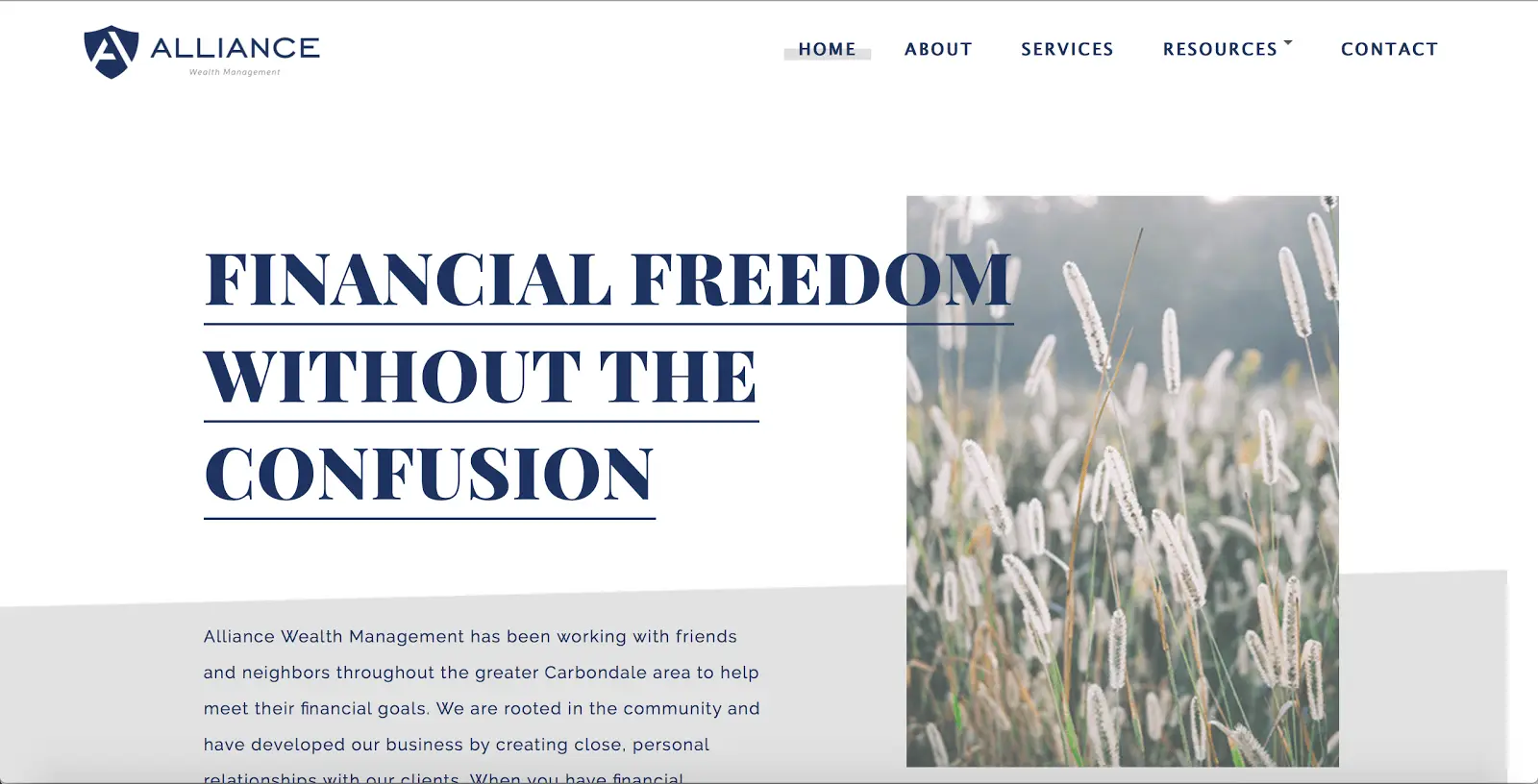Last Updated on July 20, 2020 by Phil Rogers

Have you heard of Blueleaf Advisor Jeff Rose or his main blog Good Financial Cents?
If you haven’t of Jeff or his blog then you are probably one of the few.
The blog gets over 400,000 visitors per month and it is one on the leading personal finance websites in the United States.
In this post and video, Jeff Rose shares the secrets behind his success.
You can watch the video or read the full the interview summary below.
1. From Start Up Advisor to Rock Star Blogger and Internet Marketer
What happens when you mix a military veteran, blogger, financial advisor, and an uncanny resemblance to The Rock?
The answer is Jeff Rose.
He is renowned among the online financial advisory community for his huge success he has had thanks to his numerous blogs, and continues to be on the road to success with his over 400,000 strong monthly readers.

Our own customer success coach Justin Shepard sat down with Jeff Rose to talk about blogging, building an online presence, and how you can do the same.
a. Getting started
Jeff’s story started when he graduated from SIU Carbondale after 9 years of military service in Iraq with a major in finance. He started his own financial planning firm, Alliance Investment Planning LLC, in 2007 in Southern Illinois.
However, it wasn’t until 2008 that Jeff discovered blogging, initially believing it was simply an online diary. After realizing the potential of a blog, Jeff became “obsessed”, constantly reading blog posts and books about blogging in an effort to learn about it as much as he could.
Believing this was the future, he invested all his spare time into learning about blogging, and soon started networking with other online marketing gurus, learning numerous tips and tricks from them.
He took action later that year, launching his first blog, Good Financial Cents, in July of 2008, with no readers or any knowledge of HTML and social media. He stated that these early posts no longer exist, as he admitted that they were “amateur at best”.

b. Persistance Pays Off
His blogging effort didn’t really show any particular return until 9 months in, when he landed a $2 million client, his largest at the time.
Despite his early success with the blog, it wasn’t until he went to FinCon, a conference for financial bloggers, that he started to feel like part of the blogging community.
There, he rubbed shoulders with other established bloggers in the financial space, and through networking and building his web of relations, asserted his place among the blogging world.
Jeff has since expanded his reach by creating other blogs and releasing a book.
He currently has three main online outputs, Good Financial Cents, Life Insurance by Jeff, and a podcast on marriage, which is run by both Jeff and his wife. He originally had blogs in other fields as well, but ultimately chose to cut back and focus on his three main blogs.
His target for the Good Financial Cents is now 500,000 unique visitors a month, with aspirations to hit a million a month as his ultimate goal.
c. Soldier of Finance
His book, Soldier of Finance by Jeff Rose, is based on his own personal experience of struggling through debt after his time in the army. He strongly believes that if it wasn’t for the online presence his blog provided, his book would never have been able to get published.

He recommends that other financial advisors try to publish books as well, for it grants validation and an image of expertise on the subject, increasing new prospect conversion.
2. How to Start a Financial Advisor Blog
At this point, you may be interested in starting a blog. Jeff agrees with you. He states that getting into the blogging and internet space and developing a presence is crucial for success, for he personally admits that quintessentially all advisors are “the same”.
The only delineations are your opinions and your expertise, and a blog gives you that ability to showcase what you are made of, and give readers a palpable reason why you should be the one managing their money as opposed to someone else.
a. No Excuses
Many who have notions to start a blog, however, fall victim to two main excuses that Jeff hears all the time:
- My compliance department at work won’t allow it
For the first excuse, Jeff acknowledges that for those who don’t have their own independent firm, adhering to the needs of your compliance department is a common issue. That can be mediated by being clear and transparent with what you are doing, as he did. He made sure to make his terms clear and flexible. This is how Jeff positioned his blog with compliance.
Listen, this is no different then me writing a guest column for a newspaper article, like our local paper. You’re going to see it before I publish it, so you can make any changes.
He managed to get through the first two and a half years operating his blog in this manner, posting over 800 blog posts within that time period.
Despite this, he admits that it was rather constrictive for him as a writer, and in 2011, started his own independant firm, Alliance Wealth Management, in an effort to free himself from the limitations of writing as an employee, and found it to be “so much easier”.

- I don’t have the time
This excuse, according to Jeff, is obsolete in this day and age thanks to multiple tools that allow you to “write without writing”.
His personal favorite that he uses consistently is Mobile Assistant, a mobile subscription service which allows you to record yourself hands free, and listen to it later. This makes it ideal to record and retain ideas wherever and whenever, as opposed to being confined to a desk while brainstorming.
He also suggests plenty of other alternatives that function similarly, such as Dragon, which he believes is more suited for a desktop. A recent update on Google Docs enables typing by voice, and has the additional perk of being free.
b. Build Your Brand
Once you have conquered those demons and have committed yourself to blogging, you can then start to build your site and establish yourself as a brand.
Jeff personally recommends WordPress, a free and commonly used tool when starting blogs, where you can choose from multiple templates to help shape your image.
However, you should avoid templates that come off as too common and lackluster, and consider investing in one of the paid templates that typically range between $50-$100, a rather low cost for developing a website.
A good logo is essential, and for that Jeff recommends 99designs.com, a unique platform where you describe what you are looking for in a logo, commit a certain amount of money to pay, and then from there choose from a pool of designers that submit their interpretation of what you want.

It is an economical way to find a good design that communicates the message that you desire, and you have the option of no obligation in the case that you don’t like anything that is presented to you.
c. Writing Content
After your site has been set up and you have a channel that you can post on, you now can begin writing content.
However, one struggle that many new bloggers may have is choosing a topic to write about. Jeff mentions that all you really need is a subject with a good level of relevancy to what is happening out in the real world.
One example he gives us is the topic he used in his first webinar, which was “How to Protect your Business during a Stock Market Crash”, which would be relevant in any case.
Basically anything that is currently trending and on everyone’s minds would be a draw.
d. Establish an Email List
However, even if your posts manage to entice readers initially, the chances of the reader returning are slim to none.
To boost your chances, Jeff advises new bloggers to have them join your email list, stating that it essentially replaces the traditional labor of having to put someone in your follow up list and actually call them.
To have them join the list however, Jeff advises the implementation of a “lead magnet”: a free giveaway that the customers would receive upon subscribing to his email list. In his case, it would be some kind of PDF resource, or the first two chapters from his book, in which readers could benefit from and start reading his blog in a willingness to learn more.

e. Go Easy on Promotion
After they have joined, it is important to not come on too strong with promotion right from the start, but rather build up the level of promotional engagement in a progression that encourages more and more involvement with the site.
Jeff starts with regular emails providing good quality information that they can use, to case studies demonstrating what his financial service can provide, to offering webinars, and at the end he initiates his call-to-action, a no- obligation retirement planning session, which happens about once every 6 months.
f. When In Doubt, Farm It Out
All of this, along with other various responsibilities that comes with running a site, can take up a lot of time, and requires a lot of varied skills that you may not necessarily possess.
For this reason, Jeff resolved this issue by assembling a team of people to help run the site, doing tasks such as creating images, handling emails, and managing social media through various tools such as Hootsuite, where you can arrange to have up to a month’s worth of posts on all different kinds of social media channels released periodically.
This may come off as costly, but for Jeff, it means more time spent with his family, with enriching hobbies, and most importantly, writing good content, which is the cornerstone of any good blog. Whether that is worth paying for is up to you.
g. Other Good Sources
In addition to all the advice he has given above, Jeff has also provided some literary sources for readers to learn more from.
3. Just Do It
Ultimately, his final piece of advice for aspiring financial advisors would be to get started, and not obsess over the details. He quotes this piece of advice from a former mentor.
Your 80% is probably someone else’s 110%
What this means is that while you should strive to make good quality content, don’t waste time trying to make it perfect. What is important is that you make sure to write consistently and retain a constant following of readers, for the beauty of online material, as Jeff jokingly puts it, is that “there’s an edit button”.
Jeff said that he realized that his site was going to be a success after landing his first $2 million client. It was at that point that he started to view his blog as a success, realizing that this victory was “the first of many to come”.
We’d venture to say he was right.
Want to ask Jeff a question? Just add it to the comments.